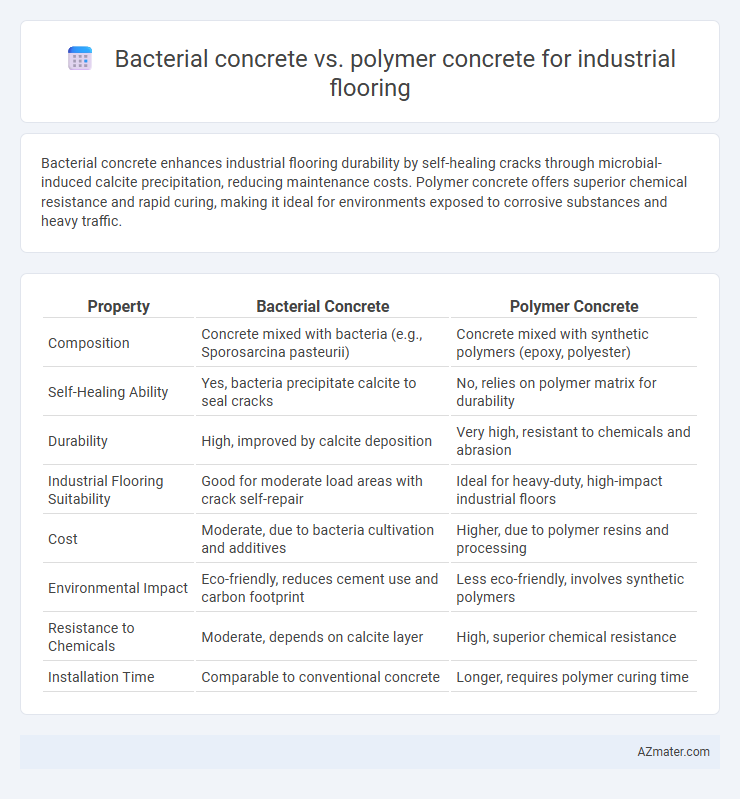Bacterial concrete enhances industrial flooring durability by self-healing cracks through microbial-induced calcite precipitation, reducing maintenance costs. Polymer concrete offers superior chemical resistance and rapid curing, making it ideal for environments exposed to corrosive substances and heavy traffic.
Table of Comparison
| Property | Bacterial Concrete | Polymer Concrete |
|---|---|---|
| Composition | Concrete mixed with bacteria (e.g., Sporosarcina pasteurii) | Concrete mixed with synthetic polymers (epoxy, polyester) |
| Self-Healing Ability | Yes, bacteria precipitate calcite to seal cracks | No, relies on polymer matrix for durability |
| Durability | High, improved by calcite deposition | Very high, resistant to chemicals and abrasion |
| Industrial Flooring Suitability | Good for moderate load areas with crack self-repair | Ideal for heavy-duty, high-impact industrial floors |
| Cost | Moderate, due to bacteria cultivation and additives | Higher, due to polymer resins and processing |
| Environmental Impact | Eco-friendly, reduces cement use and carbon footprint | Less eco-friendly, involves synthetic polymers |
| Resistance to Chemicals | Moderate, depends on calcite layer | High, superior chemical resistance |
| Installation Time | Comparable to conventional concrete | Longer, requires polymer curing time |
Introduction to Industrial Flooring Solutions
Industrial flooring solutions demand durability, chemical resistance, and sustainability, where bacterial concrete offers self-healing capabilities by using bacteria-induced calcite precipitation to repair microcracks, extending floor lifespan. Polymer concrete provides enhanced mechanical strength and excellent resistance to aggressive chemicals, making it ideal for heavy-duty industrial environments exposed to solvents, oils, and acids. Both materials address specific industrial flooring challenges, with bacterial concrete emphasizing eco-friendly maintenance and polymer concrete delivering superior structural performance.
Overview of Bacterial Concrete
Bacterial concrete employs specific microorganisms to precipitate calcite, enhancing crack healing and durability for industrial flooring applications. This bio-based material improves structural longevity by sealing microcracks autonomously, reducing maintenance costs and increasing lifespan. Its environmentally friendly properties contrast with polymer concrete, which utilizes synthetic resins but lacks self-healing capabilities inherent to bacterial concrete.
Overview of Polymer Concrete
Polymer concrete for industrial flooring is a composite material made by combining polymer resins with aggregates, offering superior chemical resistance and high compressive strength compared to traditional concrete. It ensures excellent durability, rapid curing times, and enhanced abrasion resistance, making it ideal for heavy-duty industrial environments with exposure to chemicals and mechanical stress. This flooring solution supports long service life and minimal maintenance, reducing downtime in manufacturing and processing facilities.
Key Properties of Bacterial Concrete
Bacterial concrete enhances industrial flooring durability through its self-healing capability, which automatically seals microcracks using calcite precipitated by bacteria such as Bacillus pasteurii. This bio-mediated process significantly improves compressive strength and extends structural lifespan compared to polymer concrete, which relies on synthetic resins for crack resistance. Moreover, bacterial concrete offers superior environmental sustainability by reducing maintenance needs and lowering carbon footprint relative to polymer concrete formulations.
Key Properties of Polymer Concrete
Polymer concrete for industrial flooring offers superior chemical resistance and enhanced mechanical strength compared to traditional bacterial concrete, making it ideal for environments exposed to harsh chemicals and heavy loads. Its rapid curing time and excellent adhesion to various substrates reduce downtime during installation and improve durability in high-traffic areas. The key properties of polymer concrete include low permeability, high tensile and compressive strength, and excellent resistance to abrasion and thermal shock, ensuring long-lasting industrial floor performance.
Durability and Longevity Comparison
Bacterial concrete enhances durability and longevity in industrial flooring through self-healing properties that seal microcracks, reducing maintenance and extending service life by up to 30%. Polymer concrete offers superior resistance to chemical attacks, abrasion, and impact, resulting in a lifespan typically exceeding 25 years under heavy industrial use. Comparing both, bacterial concrete excels in crack repair and sustainability, while polymer concrete provides consistent mechanical strength and chemical resilience essential for harsh industrial environments.
Resistance to Chemicals and Abrasion
Bacterial concrete exhibits enhanced chemical resistance due to the biomineralization process where bacteria precipitate calcium carbonate, sealing micro-cracks and reducing permeability against industrial chemicals. Polymer concrete offers superior abrasion resistance through its synthetic resin matrix that binds aggregates tightly, providing durable surfaces under heavy mechanical stress. For industrial flooring, selecting between bacterial and polymer concrete depends on balancing the need for chemical durability against high abrasion tolerance.
Environmental Impact and Sustainability
Bacterial concrete utilizes microorganisms to precipitate calcium carbonate, enhancing self-healing properties and reducing the need for repairs, which lowers the carbon footprint associated with maintenance. Polymer concrete incorporates synthetic resins, offering high chemical resistance and durability but involves petrochemical-based components that challenge recyclability and generate higher embodied energy. Industrial flooring benefits environmentally from bacterial concrete's potential for carbon sequestration and extended lifespan, while polymer concrete's resistance to harsh industrial chemicals can reduce replacement frequency, though its sustainability is limited by non-biodegradable materials.
Cost-Effectiveness and Maintenance
Bacterial concrete reduces maintenance costs by self-healing micro-cracks, extending the lifespan of industrial flooring and minimizing repair expenses. Polymer concrete offers faster curing times and high chemical resistance, which reduces downtime and maintenance frequency in industrial environments. Cost-effectiveness depends on project scale: bacterial concrete has higher upfront costs offset by long-term durability, while polymer concrete provides budget-friendly installation with moderate maintenance requirements.
Choosing the Best Concrete for Industrial Flooring
Bacterial concrete enhances self-healing capabilities by utilizing bacteria to precipitate calcium carbonate, reducing maintenance costs and extending the lifespan of industrial flooring exposed to heavy loads and chemical spills. Polymer concrete offers superior chemical resistance, high tensile strength, and rapid curing times, making it ideal for environments with aggressive chemicals and frequent mechanical stress. Selecting the best concrete for industrial flooring depends on specific site conditions, load requirements, and exposure to chemicals, where bacterial concrete excels in durability through self-repair while polymer concrete provides maximum protection against corrosive substances.

Infographic: Bacterial concrete vs Polymer concrete for Industrial flooring
 azmater.com
azmater.com